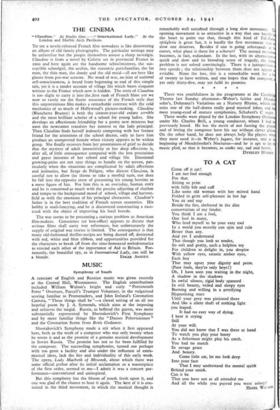MUSIC
Symphony of Youth A CONCERT of English and Russian music was given recently at the Central Hall, Westminster. The English contributions included William Walton's bright and early " Portsmouth Point " Overture, Purcell's Trumpet Voluntary, in the vulgarised scoring familiar to Promenaders, and John Ireland's Coronation Cantata, " These things shall be "—a choral setting of an all too hopeful poem by J. A. Symonds, which aims at the imposing and achieves the turgid. Russia, as befitted the guests, was more substantially represented by Shostakovich's First Symphony and by more familiar things like the " Danses Polovtsiennes and the Coronation Scene from Boris Godunov.
Shostakovich's Symphony made a stir when it first appeared here, both as the work of a composer who was only twenty when he wrote it and as the promise of a genuine musical development in Soviet Russia. The promise has not so far been fulfilled by the composer. The succeeding symphonies, turned out perhaps with too great a facility and also under the influence of extra- musical ideas, lack the fire and individuality of this early work. The opera, Lady Macbeth of Mtsensk, about which there was some official pother after its initial acclamation as a masterpiece of the first order, seemed to me—I admit it was a concert per- formance—conventional and uninspired.
But this symphony has the bloom of youth fresh upon it, and one was glad of the chance to hear it again. The best of it is con- tained in the third movement, in which the musical thought is
remarkably well sustained through a long slow movement. 1:4 opening movement is so attractive in a way that one hardly :14 the heart to point out that, though this kind of spieglerie is great fun, it is hardly the first movement that slow one deserves. Besides if one is going scherzando at outset, what place is there for a scherzo? The second movernQ becomes, in' fact, redundant. In the last, with its alternations quick and slow and its brooding sense of tragedy, the forall problem is not solved convincingly. There is a juxtaposition el two speeds ; the relationship between them does not appear in evitable. None the less, this is a remarkable work for a bl of twenty to have written, and one hopes that the composer, yet only thirty-five, may yet fulfil its promise.


























 Previous page
Previous page